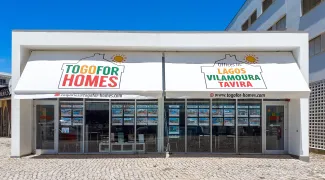(Translated by Google)
Rathenau points the finger at the inefficiency and lack of action of local authorities, especially local authorities. «On the one hand, the Municipal Councils act excessively slowly in the licensing processes for construction projects and, on the other, they allow the uncontrolled proliferation of thousands of illegal constructions. The result is a real estate development marked by disorder, reminiscent of the Wild West, where the logic of every man for himself prevails, without any effective control”, he states.
barlavento: when you say “urbanistic Western”, what do you mean?
Alexander Rathenau: In the Algarve, especially in the Western Algarve, large-scale illegal construction has been taking place for several years, often accompanied by earthmoving and destruction of vegetation, sometimes leading to the obstruction of public paths. In the municipalities of Lagos, Vila do Bispo and Aljezur, which I know well, there are thousands of illegal constructions – and new ones appear every day. A common practice is the installation of prefabricated houses in the middle of the landscape, in addition to hundreds of shacks, caravans and other improvised or precarious housing. This is a serious problem, as it leads to the progressive destruction of nature, particularly in sensitive areas such as areas classified as National Agricultural Reserve (RAN), National Ecological Reserve (REN) and the Costa Vicentina and Southwest Alentejo Natural Park.
Despite this, the number of irregular constructions continues to grow without effective control for years. In fact, many people who build illegally have sufficient financial resources to purchase properly licensed housing. They choose not to do so for a variety of reasons and there are several factors that contribute to this phenomenon.
It is important to highlight that urban planning legislation applies to permanent modular construction, characterized by the use of modular construction elements or systems, whether structural or non-structural, partially or totally manufactured in an industrial unit, and subsequently assembled at the site of implementation, regardless of whether they are removable or transportable.
How can it be explained that the number of these types of illegal constructions continues to increase?
Municipal Councils, which should act as the main supervisory bodies, do not intervene or do so effectively. It has become widely known, also among foreigners, that illegal construction in the region rarely brings consequences. Even when there are demolition orders, they are virtually never carried out. When someone sees that their neighbor is building without a permit and is not facing any problems, they consider it unfair to follow the rules and end up doing the same. Many people who inherit unbuildable land build illegally with the aim of selling it later at inflated prices, often with the connivance of real estate agents.
Furthermore, there are those who justify their irregular constructions in the middle of the countryside with the desire to raise their children in contact with nature. However, I consider this a contradiction, as they end up degrading the very environment they claim to want to preserve.
And what about so-called mobile homes, whose business is growing?
I consider it unacceptable that the legislator has not yet adopted effective measures to prevent the mass commercialization of mobile constructions. Precast structure sellers and their advertising are increasing due to growing demand. The sale of these structures should be prohibited without the presentation of an urban title that legitimizes their construction. A businessman who makes a sale without this prior control must be jointly and severally liable for the costs that the City Hall bears for the removal of the clandestine structure. Currently, an approved project is required to request an electrical connection, while the installation of an irregular building can occur without any control. This situation is unsustainable and cannot persist.
Why do you say that city halls do not act?
For several reasons. Mayors, elected by popular vote, avoid adopting unpopular measures, such as the demolition of irregular buildings, so as not to compromise the image of their party or their own chances of reelection – even when the law requires them to act. Even more worrying is the fact that most city councils only intervene in the event of irregular construction when there is a formal complaint from someone, for example, a neighbor, thus compromising the Rule of Law itself.
Furthermore, many City Halls do not have sufficient financial resources – or simply choose not to allocate resources in the budget – to carry out the demolition of irregular buildings.
Does this mean that city councils should carry out demolitions?
City councils have a legal duty to promote the demolition of irregular buildings when they do not comply with urban planning standards and cannot be legalized. The legislation provides that, if the owner does not voluntarily carry out the demolition within the established deadline, the City Hall must proceed with the coercive execution, assuming administrative possession of the property and carrying out the necessary works to remove the irregular construction. The costs of this intervention, including any compensation or resettlement expenses, are the responsibility of the offender and may be collected through tax enforcement or, in certain cases, through forced leasing of the property.
However, the principle of equality in administrative law requires that similar cases be treated identically, which creates a practical problem for local authorities. If a City Council decides to demolish an illegal building, it should, in theory, apply the same measure to all other similar infractions.
However, given the scale of the problem, with thousands – or even hundreds of thousands – of illegal constructions in the Algarve alone, it becomes unfeasible to apply this principle uniformly. This raises questions about selectivity in the monitoring and execution of demolitions, which could generate perceptions of injustice among citizens and political difficulties for municipalities in managing these situations.
Is it also possible that in certain cases, local authorities turn a blind eye?
I regularly receive confidential information about corruption cases that undermine the functioning of the rule of law. In some situations, irregular constructions are intentionally tolerated or even encouraged, motivated by financial or personal interests. In short, all these factors explain why illegal construction activity continues to proliferate and why effective enforcement of urban planning regulations rarely occurs.
Given that Municipal Councils, despite being legally obliged, do not effectively fulfill their supervisory function, an independent entity could be created to assume this responsibility. The legislation already grants city governments all the necessary powers: they can take possession of illegal buildings, demolish them and demand reimbursement of expenses from those responsible, as I have already mentioned.
Until these mechanisms are used, irregular construction will continue to go unpunished. The fines applied, in addition to being sporadic, are too low to have a truly deterrent effect. If Councils were to start demolishing illegal housing, this would have an exemplary effect and discourage further offences. But reality shows that they will hardly act without external pressure.
Still, I believe that the most appropriate solution for defending the Rule of Law would be for municipalities to assume their responsibilities, without the need for an external oversight body. The creation of such an entity would raise constitutional issues, given that local authorities benefit from broad administrative autonomy. However, by continuing to systematically tolerate the violation of urban planning regulations, they end up compromising the legitimacy of this institutional protection.
And the owners, why aren't they held accountable?
As I mentioned, in practice, Municipal Councils apply small fines, which do not have a significant deterrent effect. As a consequence, these sanctions do not prevent other people from continuing to resort to clandestine construction, perpetuating illegality and the degradation of urban planning.
Failure by the offender to comply with a demolition order may, in certain cases, constitute a crime of disobedience. The legislation establishes that failure to comply with administrative acts that impose measures to protect urban legality constitutes a crime of disobedience, under the terms of article 348 of the Penal Code. However, City Halls rarely forward these cases to the Public Prosecutor's Office, thus preventing criminal proceedings from being opened against those responsible.
Furthermore, in the criminal cases that I followed as a lawyer, the penalties applied were limited, in most cases, to low-value fines, without the irregular constructions being effectively demolished by the convicted parties. A clear demonstration of the weaknesses of the rule of law.
In practice, what measures could effectively combat illegal construction?
Another fundamental aspect that the legislator must consider, if he decides to implement measures to combat illegal construction, is the creation of an effective mechanism to hold accountable those who carry out contract work within the scope of illegal construction.
This includes companies that carry out unauthorized earthworks, erect buildings without prior control, among other infractions. These companies should at least be held responsible, as should the property owner, for the costs of demolishing irregular buildings and, in my opinion, should be subject to paying high fines.
Furthermore, the law should expressly provide that real estate agents are liable for financial damages suffered by buyers who acquire clandestine or semi-clandestine properties, unless they can demonstrate, unequivocally, that the buyer was fully aware of the urban irregularity of the property.
In fact, in the exercise of my activity as a lawyer, if, within the scope of a mandate for the purchase and sale of an urban building, I do not verify the urban legality of the same and my client suffers losses resulting from this omission, he may invoke the breach of the mandate contract and demand due compensation from me.
What is your opinion on the controversial land law?
I believe that land law is a good tool to facilitate the creation of urban land by local authorities. However, there is a lot of misinformation surrounding this legislation, which wrongly leads to the perception that Municipal Councils now have arbitrary power to convert agricultural land into urbanizable areas.
One of the most relevant changes introduced by this law is the possibility of reclassifying agricultural land adjacent to urban areas for housing purposes, as long as it meets certain criteria. The main objective is to facilitate the development of new residential neighborhoods and ensure more balanced urban growth, without compromising sensitive ecological areas. It is important to emphasize that the land included in the RAN or REN remains protected, ensuring the preservation of its environmental functions and avoiding negative impacts on ecosystems.
Do you consider then that some improvements have been introduced recently in the area of urban planning law?
In recent months, the legislator has implemented some positive measures, but also one that I consider extremely negative. Currently, the use of a new building no longer depends on the issuance of a usage license, it being sufficient for the responsible architect to certify the work's compliance with the approved project. A good measure. Additionally, specific deadlines were established for the assessment of licensing requests by city halls.
Since March 4, 2024, City Halls are required to respond within specific deadlines: 120 days for projects with a gross construction area of up to 300 square meters (m²) and 150 days for buildings between 300 m² and 2,200 m², as well as for listed properties. If there is no response within these deadlines, the project is automatically considered approved. This new approach aims to speed up processes and reduce bureaucracy. This is also a good measure. Furthermore, the increasing digitalization of procedures can speed up the approval of housing projects, making construction more efficient.
However, there are still flaws in recent legislation…
A serious flaw in the legislation was the elimination of the obligation to prove the legality of a property before its sale. This change allowed thousands of irregular constructions to enter the real estate market, being acquired by uninformed buyers, who end up facing high financial losses. This is a deeply inadequate measure.
It is unreasonable that municipalities do little to combat illegal construction, while the national legislator ends up benefiting those who built illegally, by allowing the sale of these properties without any restrictions. Measures like these undermine confidence in the rule of law and encourage the proliferation of irregular constructions. Real estate agents take advantage of this loophole to market land with irregular buildings, omitting from buyers that these buildings cannot be used legally and are subject to demolition orders at any time.
There are many urban planning rules that are truly ridiculous and difficult to justify, especially when you take into account the existence of thousands of illegal buildings. An example of this is the requirement for a landscape plan for a properly licensed building, while the City Hall does little to contain the proliferation of clandestine constructions. It seems disproportionate to give so much importance to gardening when there are much more urgent urban problems that need to be resolved. However, I believe that the main obstacle continues to be the slowness of city halls in processing urban planning processes, even after the so-called urban simplex came into effect.
What do you recommend to boost the Portuguese economy and the housing sector?
Portugal should consider a combination of economic stimulus and strategic fiscal adjustments. One of the options would be the progressive reduction of Corporate Income Tax (IRPJ), in order to relieve pressure on companies and attract investment. The Portuguese government has already announced its intention to reduce the current rate of 20%. If the mainland were to adopt the same reduced rate of 15% – similar to the 14.7% already applied in Madeira and the Azores – this would send a positive signal to international investors.
For large companies with very high income, higher tax rates could be established, ensuring a balance between tax competitiveness and tax fairness. Furthermore, tax benefits and financial support for start-ups and small businesses could boost the economy and, in the long term, increase tax revenue.
The new tax regime for non-habitual residents, known as RNH 2.0, is not very attractive, as it restricts tax benefits to a limited number of professions and only when carried out in companies with specific characteristics. The legislator should reconsider the program and make it more inclusive. A more comprehensive regime, which offers tax incentives to a wider range of professionals – regardless of the company they work for or whether they work as independent professionals – would help to attract qualified talent to Portugal.
It is essential to implement more competitive policies at an international level, capable of achieving global recognition, as occurred with the Non-Habitual Resident Status of 2009, which, before its extinction, attracted thousands of foreigners to Portugal. Just as this scheme benefited retirees, in the future, similar measures should be aimed at investors and businesspeople.
And what about those who choose Portugal to enjoy their retirement?
Retirees who choose to move to Portugal should benefit from this status again, as they are the ones who have brought a significant amount of capital to the country over the past 15 years. It is important to emphasize that the presence of these retirees, when purchasing or renting housing, was not responsible for the shortage of affordable housing in Portugal, as some politicians say.
How do you assess the existing tax benefits for investors?
I believe that the legislator should reconsider certain tax exemptions that have not produced the expected results, directing these resources towards more effective and sustainable policies. In fact, the entire Tax Benefits Statute should be subjected to a thorough review.
It is equally essential to modernize tax collection systems and strengthen the fight against tax evasion. The use of technologies such as Artificial Intelligence could make tax collection more efficient and make tax evasion practices more difficult. Awareness campaigns, associated with greater transparency in administrative processes, would be fundamental to strengthening citizens' trust in the tax system and promoting greater compliance with tax obligations. It is, for example, difficult to understand that someone who registers as a tax resident in Portugal is not automatically notified by the Tax Authority to submit their IRS declaration. Many of my clients are tax residents in Portugal, but have never received any communication from the tax authorities to comply with this obligation, despite it being expressly provided for in current tax legislation.
Tax evasion, distrust and populism
For Alexander Rathenau, «in Portugal, a deeply rooted culture of tax evasion persists, often supported by illegal practices. A common example is the refusal of many landlords to formalize lease agreements, with the aim of avoiding declaring income to the Federal Revenue Service. This type of behavior is, to a large extent, associated with distrust in the political class, fueled by successive corruption scandals that have shaken the credibility of institutions».
The Chega party, says the lawyer, “has exploited this discontent, promoting the perception that the entire political elite is corrupt, fomenting fear and discrediting democratic institutions. He even goes so far as to advocate a cleansing of Portugal, an alarming rhetoric that evokes totalitarian speeches of the past. This approach not only undermines trust in the democratic system, but also weakens the rule of law, pushing constructive solutions away and promoting social divisions rather than effective responses to the country’s structural problems.”
On the contrary, he recommends, “what is really needed is an effort to clarify to the population that the vast majority of politicians are not involved in corrupt practices, that dedication to public service deserves recognition and that many of these professionals could even earn significantly more income outside of politics.”
Perhaps less debated, but also decisive in solving the housing crisis, would be a review of Inheritance Law, says Portuguese-German lawyer Alexander Rathenau.
Source: https://www.barlavento.pt/algarve-o-faroeste-urbanistico/










